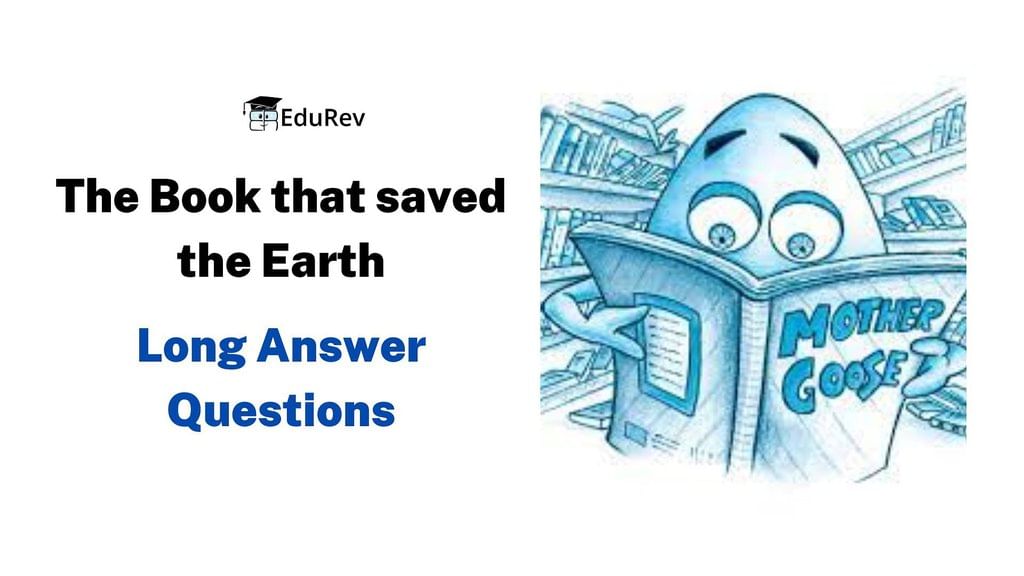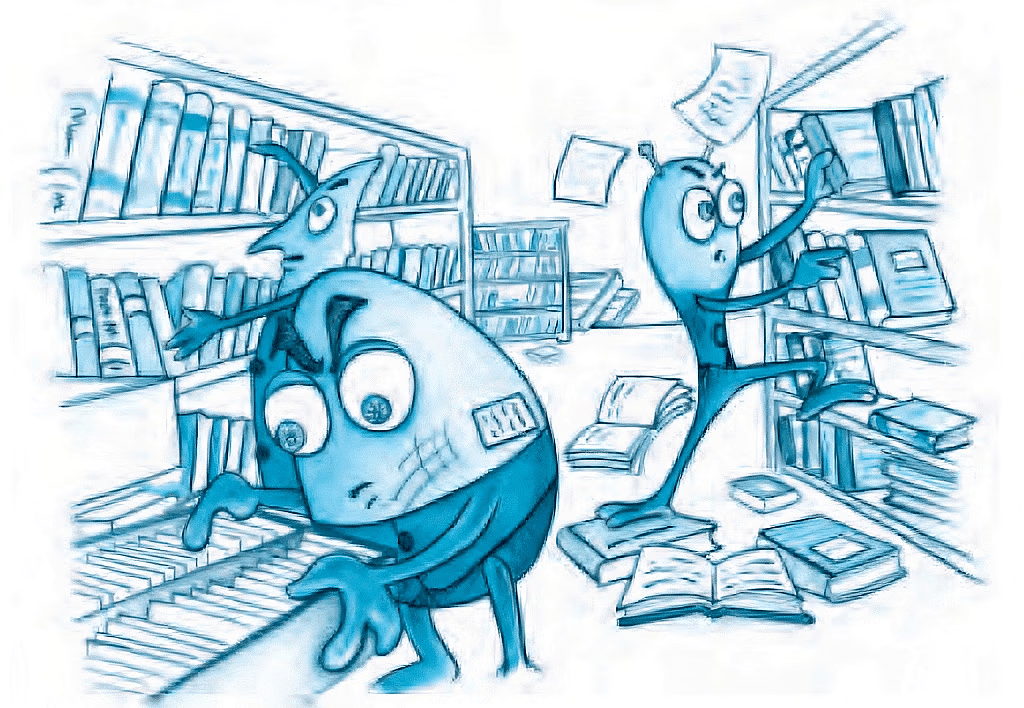Class 10 English Chapter 9 Question Answers - The Book that saved the Earth

Q1. Give a character sketch of Noodles highlighting his diplomatic handling of Think-Tank and even suggesting things without offending his mighty chief.
Ans: Noodles adeptly navigates a complex relationship with the Think-Tank, the Commander-in-Chief of Mars, who is renowned for his exceptional intelligence. Despite Think-Tank's formidable presence, Noodles fosters a positive rapport through his skills in humility and persuasion. He skillfully suggests new ideas, particularly regarding books, ensuring that Think-Tank feels respected and not undermined. Noodles possesses an extraordinary ability to read both people and situations, which allows him to manipulate circumstances to his advantage. This talent is evident in how he corrects Think-Tank's mistakes without causing offence. Historians note that Noodles eventually replaces the Great and Mighty Think-Tank, symbolising a victory of wisdom and common sense over arrogance. This transition underscores Noodles' diplomatic handling of a powerful figure, highlighting his cleverness and deep understanding of human nature.
Q2. Historians speak highly about books. How can books help you in preventing a catastrophe?
Ans: In the view of a twenty-fifth-century historian, books are essential to human life. They educate, inspire, and guide us in many areas. The historian believes that books played a vital role in preventing the Martian invasion of Earth. The Martians, misunderstanding the meaning of poems in books, became frightened and ultimately retreated from Earth, abandoning their planet, Mars. In our everyday lives, books provide solutions to various problems, whether related to health, personal growth, or other matters. Therefore, books can help us avert catastrophes by offering knowledge and insights that enable us to make informed decisions and take appropriate actions. The historian's admiration for books highlights their enduring significance and relevance in shaping human civilization.
Q3. How did one old book of nursery rhyme to save the earth from a Martian invasion?
Ans: The old, dusty book of nursery rhymes known as Mother Goose. The Martian leader, Think-Tank, intended to invade Earth and dispatched Probe One to gather intelligence about humans. Upon entering a library, the crew consumed vitamins and discovered Mother Goose. However, they misunderstood the nursery rhymes as threats. After hearing the first rhyme, 'Mistress Mary', Think-Tank mistakenly believed that Earthlings had mastered the art of combining agriculture with mining. The second rhyme, 'Hey Diddle, Diddle', led him to think that humans could launch an interplanetary attack involving millions of cows. The third rhyme, 'Humpty Dumpty', featured a character resembling Think-Tank, which terrified him. Overwhelmed by fear, Think-Tank abandoned the invasion plan and fled to Alpha Centauri. Thus, a simple book of nursery rhymes ultimately saved Earth from a Martian invasion.
Q4. Justify the title of the play ‘The Book that Saved the Earth’.
Ans: A good title should reflect the theme or key elements of a story. In the play 'The Book that Saved the Earth', a book of nursery rhymes by Mother Goose plays a crucial role in preventing a Martian invasion. The Martian ruler, Think-Tank, intends to invade Earth and sends Probe One to gather information. However, when the Martians enter a library, they struggle to understand what books are. They mistakenly consume vitamins to enhance their intelligence and then read the nursery rhymes. Think-Tank misinterprets these rhymes as threats, prompting him to recall Probe One and abandon the invasion plan. Consequently, he and his subjects flee to Alpha Centauri, far from Earth. Thus, the nursery rhymes from Mother Goose are responsible for saving the planet. The title 'The Book That Saved the Earth' aptly reflects this central theme.
Q5. ’Pride has a fall’. Justify this statement, giving relevant points from how Think-Tank reacted to the readings from Mother Goose.
Ans: The statement 'pride has a fall' is clearly demonstrated by Think-Tank's reactions to the readings from Mother Goose. As the leader of the Martian invasion team, Think-Tank was excessively proud of his intelligence, believing himself to be the wisest being on Mars. However, he misinterpreted the nursery rhymes from Mother Goose in a literal sense, which revealed his lack of consideration for others' viewpoints and his fickle-mindedness. For instance, the rhyme Mistress Mary prompted him to reflect on the discovery of Earth, while the poem 'diddle-diddle' alarmed him. However, it was the poem 'Humpty Dumpty' that frightened him so much that he decided to flee his kingdom and escape to Alpha Centauri. This reaction undermined his supposed wisdom, leading to his significant downfall, thereby justifying the statement 'pride has a fall.'
Q6. Why does Think-Tank decide to run away from Mars? What does the historian say after she has narrated the incident?
Ans: Think-Tank decides to flee from Mars because he feels threatened by the Earthlings. After reading the nursery rhyme ‘Humpty Dumpty’, he sees a picture that resembles him, which frightens him. He fears that the Earthlings have discovered his presence and are planning to capture him along with Mars Central Control. In a state of panic, he instructs Noodles to prepare a space capsule for an immediate escape to Alpha-Centauri, which is a hundred million miles away. After narrating this incident, the historian comments that an old book of nursery rhymes ultimately saved Earth from a Martian invasion. She explains that in the twenty-fifth century, five hundred years later, Earthlings resumed contact with Mars and developed a friendship with the Martians. They educated them about the differences between books and sandwiches, leading to the establishment of a model library in their capital, Marsopolis.
Q7. What does the historian tell the audience about the twentieth century and Mars?
Ans: This imaginary story takes place in the twenty-fifth century at the Museum of Ancient History, specifically in the Department of the Twentieth Century. A historian presents a talk to the audience using a movie projector. She explains that the twentieth century was often called the Era of the Book. During this period, books covered every conceivable topic, educating people on various subjects. However, the most extraordinary event was when a book saved the Earth. She recounts a true story from the twenty-first century about a Martian invasion in 2040. Surprisingly, this invasion was averted thanks to a single book—a collection of nursery rhymes. This book, rather than a scientific manual or military guide, played a crucial role in protecting the planet from the Martians. The historian concludes by highlighting the irony that such a simple book could have such a significant impact on the fate of Earth.
Q8. Who is a think tank? Why has he sent a manned spacecraft to Earth?
Ans: Think-Tank is the Commander-in-Chief of the Mars Space Control Room. He is depicted with a large, egg-shaped head and wears a long robe decorated with stars and circles. His assistant, Noodles, operates a switchboard next to him. Think-Tank has sent a manned spacecraft to Earth to collect information about the planet's defense systems. This intelligence will be sent back to the Martian fleet, which is preparing to attack Earth before lunch. The story unfolds around the Martian invasion of 2040, which ultimately did not take place. A single book, a collection of nursery rhymes, played a crucial role in preventing the invasion. A historian reveals these events through a film presentation, showcasing the Mars Space Control Room and Think-Tank's actions.
|
61 videos|856 docs|69 tests
|
FAQs on Class 10 English Chapter 9 Question Answers - The Book that saved the Earth
| 1. What is the main theme of "The Book That Saved the Earth"? |  |
| 2. Who are the main characters in the story, and what roles do they play? |  |
| 3. How does the book illustrate the concept of misunderstanding between different cultures? |  |
| 4. What message does the author convey about the significance of books in society? |  |
| 5. How does the story conclude, and what is its final message regarding the future of Earth? |  |

















